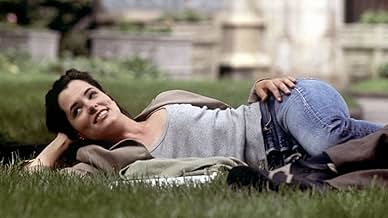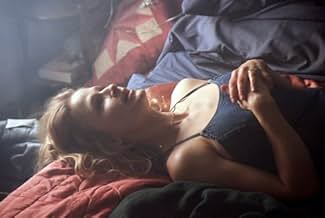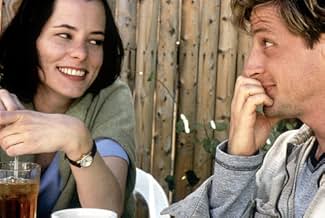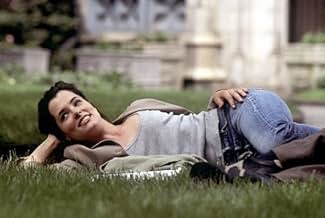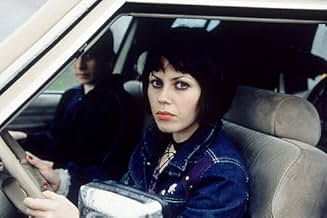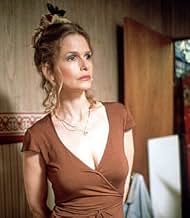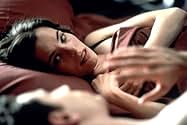AVALIAÇÃO DA IMDb
6,4/10
4 mil
SUA AVALIAÇÃO
Adicionar um enredo no seu idiomaThree women's escapes from their afflicted lives. Each struggles to flee from the men who confine their personal freedom.Three women's escapes from their afflicted lives. Each struggles to flee from the men who confine their personal freedom.Three women's escapes from their afflicted lives. Each struggles to flee from the men who confine their personal freedom.
- Prêmios
- 6 vitórias e 5 indicações no total
John Ventimiglia
- Narrator
- (narração)
Joel de la Fuente
- Thavi Matola
- (as Joel De La Fuente)
Avaliações em destaque
I don't know why there are so many recent attempts at this sort of thing: individual episodes that approach and overlap the same concept. Perhaps it is because it is easier to craft episodes with power rather than worry about an arc of 90 minutes or more.
But we do have them. Some work amazingly well. I found 'Things you can tell' nearly lifealtering because of the crafty way all the actresses picked up each others' mannerisms to merge into the same woman. '!0 Conversations' was a different take, with the action all occurring in the same world. Less effective overall (with a more overt politics) but well structured.
This, however, is a mess. It bludgeons. It repeats. It insists on obviousness. No subtly is allowed: either an effect shouts or is bleached away. And the worst thing, the most damaging thing that can be said: there is no reward, no insight, no enrichment for the rawness we experience.
Wallace Shawn and a talented cinematographer wasted as well. Shame.
The reliable Parker Posey has a line so wonderful, so noticeably superior to all else, I am convinced she made it up: she says she needs to get an underwater camera.
Ted's Evaluation -- 1 of 4: You can find something better to do with this part of your life.
But we do have them. Some work amazingly well. I found 'Things you can tell' nearly lifealtering because of the crafty way all the actresses picked up each others' mannerisms to merge into the same woman. '!0 Conversations' was a different take, with the action all occurring in the same world. Less effective overall (with a more overt politics) but well structured.
This, however, is a mess. It bludgeons. It repeats. It insists on obviousness. No subtly is allowed: either an effect shouts or is bleached away. And the worst thing, the most damaging thing that can be said: there is no reward, no insight, no enrichment for the rawness we experience.
Wallace Shawn and a talented cinematographer wasted as well. Shame.
The reliable Parker Posey has a line so wonderful, so noticeably superior to all else, I am convinced she made it up: she says she needs to get an underwater camera.
Ted's Evaluation -- 1 of 4: You can find something better to do with this part of your life.
The best thing about this film are the three superb performances by the lead actresses in each segment. It's also a chance to explore the potential for short form film narrative by putting three short films together to create a full length feature. If these three films had been produced individually, almost no one would ever see them. The film is exciting too, as an example of the artistic possibilities of low budget digital film making. As others have mentioned the narration almost sinks the movie. I'd love to see a DVD alternative version without it.
as you probably have heard, this is a movie that consists of three portraits. three very contrived, hard-to-watch portraits.
this movie charges out of the gate with incredible potential, including a great cast, an effective score, and nearly disorienting (yet, rather successful) camera work. additionally, at the start of the first portrait, the narrative freezes, and the narrator urges the viewer to, "wait!" so he can explain something about what's going on. this device is wonderful, and immediately gives the viewer a healthy shot of intrigue. additionally, at this point, you'll probably be really excited at the unorthodox pacing that the film seems to be setting up.
that's all in the first few minutes. and this movie literally screamed in a nosedive downward from there.
while "personal velocity" bucks conventions in many ways, it bucks the concept of storytelling so much that it is simply contrived. want to see development, plot, resolution? not here. this movie tries HARD to dodge all these things, and relentlessly starves the viewer of any of these elements with its spare dialogue.
but in the absence of these elements, what's left is - quite frankly - repetition. the characters simply keep doing what they did in the first moments of their portrait (or at least what the filmmakers set them up to do). and while they rather gratingly repeat their actions, there is no true character development.
to combat this (and surely the problem of converting short stories to film), the movie employs a narrator. this (and the repetition) is the downfall. first of all, who is the narrator? well, it's a male, which is strange since this is mainly a story about three women. ok, but why is he male? and why is he speaking so conversationally at some points? and why does he know of all these women? none of these questions are answered, and the viewer is forced to contend with this narrator who speaks incessantly throughout the entire film.
now this narrator suffers from an additional problem, which plagues the film: heavy-handedness. the narrator says things like, "she could feel the emotion like a vortex pulling her soul inward." that's actually not a direct quote, but it's very close. i am not exaggerating. at one point a character says, "you look you're waiting for something." and the narrator breaks in, "she was, she always has been." this movie can't afford such lead-weighted narration. and it certainly does not fall in line with the narrator's other parts where he's talking about how great kyra sedgewick's ass looks in jeans.
in the end, you've got however many minutes (i don't know 90ish?) of superb acting and inventive cinematography. but anchoring it down without an inch of slack to go anywhere is an overbearing narrator, and three equally overbearing and repetitious movements of what could have probably been a compelling film.
this movie charges out of the gate with incredible potential, including a great cast, an effective score, and nearly disorienting (yet, rather successful) camera work. additionally, at the start of the first portrait, the narrative freezes, and the narrator urges the viewer to, "wait!" so he can explain something about what's going on. this device is wonderful, and immediately gives the viewer a healthy shot of intrigue. additionally, at this point, you'll probably be really excited at the unorthodox pacing that the film seems to be setting up.
that's all in the first few minutes. and this movie literally screamed in a nosedive downward from there.
while "personal velocity" bucks conventions in many ways, it bucks the concept of storytelling so much that it is simply contrived. want to see development, plot, resolution? not here. this movie tries HARD to dodge all these things, and relentlessly starves the viewer of any of these elements with its spare dialogue.
but in the absence of these elements, what's left is - quite frankly - repetition. the characters simply keep doing what they did in the first moments of their portrait (or at least what the filmmakers set them up to do). and while they rather gratingly repeat their actions, there is no true character development.
to combat this (and surely the problem of converting short stories to film), the movie employs a narrator. this (and the repetition) is the downfall. first of all, who is the narrator? well, it's a male, which is strange since this is mainly a story about three women. ok, but why is he male? and why is he speaking so conversationally at some points? and why does he know of all these women? none of these questions are answered, and the viewer is forced to contend with this narrator who speaks incessantly throughout the entire film.
now this narrator suffers from an additional problem, which plagues the film: heavy-handedness. the narrator says things like, "she could feel the emotion like a vortex pulling her soul inward." that's actually not a direct quote, but it's very close. i am not exaggerating. at one point a character says, "you look you're waiting for something." and the narrator breaks in, "she was, she always has been." this movie can't afford such lead-weighted narration. and it certainly does not fall in line with the narrator's other parts where he's talking about how great kyra sedgewick's ass looks in jeans.
in the end, you've got however many minutes (i don't know 90ish?) of superb acting and inventive cinematography. but anchoring it down without an inch of slack to go anywhere is an overbearing narrator, and three equally overbearing and repetitious movements of what could have probably been a compelling film.
Writer and director Rebecca Miller(daughter of legendary playwright Arthur) patches together three stories of three different women for this film and the movie itself is quite an intriguing curiosity for it.
Delia(Kyra Sedgwick,familiar yet still distinctive here)is an abused housewife and mother who's only known really one thing about herself-her sexuality-and has to find a way out of her sad,low-esteemed predicament,while wondering if she should use her sexuality or not; Greta(Parker Posey,for whom the type of roles she could inhabit are practically limitless) is a career-driven woman whose marriage is peaceful but uninspiring; and Paula(Fairuza Balk,whose angry eyes and wild visage is an ironic contrast to the scared character she's playing),has escaped a horrifying accident and now aids a runaway teen,all the while mindful of the fact that she's just learned she's pregnant.
I must say I was quite pleased with elements of the movie:the narration,the anthology of it and,of course,the actors,who all are very fine here. But I suppose what left me dry here was the way these stories played out. I will not go into any detail so as to inadvertently throw out spoilers,but it to me felt like these stories were resolved in ways that seemed only evident to the writer herself. I read one reviewer describe these tales as sorts of "Women's lib" stories,and that may be true,and not being a woman myself and certainly not a feminist,I suppose if these endings seemed lost on me,well,that's my problem I suppose.
Not a movie for those who absolutely NEED their films to have a sort of set,rising-plot/climax/denouement model in order to digest their usage of 90 min to 2 hours of time,but I suspect that the film's creator doesn't really care about that. She set out to portray three ordinary yet intriguing characters and,for the most part,I feel like she succeeded.
Delia(Kyra Sedgwick,familiar yet still distinctive here)is an abused housewife and mother who's only known really one thing about herself-her sexuality-and has to find a way out of her sad,low-esteemed predicament,while wondering if she should use her sexuality or not; Greta(Parker Posey,for whom the type of roles she could inhabit are practically limitless) is a career-driven woman whose marriage is peaceful but uninspiring; and Paula(Fairuza Balk,whose angry eyes and wild visage is an ironic contrast to the scared character she's playing),has escaped a horrifying accident and now aids a runaway teen,all the while mindful of the fact that she's just learned she's pregnant.
I must say I was quite pleased with elements of the movie:the narration,the anthology of it and,of course,the actors,who all are very fine here. But I suppose what left me dry here was the way these stories played out. I will not go into any detail so as to inadvertently throw out spoilers,but it to me felt like these stories were resolved in ways that seemed only evident to the writer herself. I read one reviewer describe these tales as sorts of "Women's lib" stories,and that may be true,and not being a woman myself and certainly not a feminist,I suppose if these endings seemed lost on me,well,that's my problem I suppose.
Not a movie for those who absolutely NEED their films to have a sort of set,rising-plot/climax/denouement model in order to digest their usage of 90 min to 2 hours of time,but I suspect that the film's creator doesn't really care about that. She set out to portray three ordinary yet intriguing characters and,for the most part,I feel like she succeeded.
A critic I read before seeing this movie (Lynden Barber of the Sydney Morning Herald) opined that it was a book illustrated with film rather than a proper movie. He's right, but that does not make it a complete write-off. There is as much voice-over as in a football match (why use a male?) but the visuals still convey some of the stories, which are not all without interest.
There are three separate stories of women having trouble with men; two from the working class and one an upwardly mobile book editor. They are tenuously connected by a street incident. One has a bashing husband, another, a husband she has outgrown, and the third has problems with her boyfriend, her stepfather and her maternal instinct. All seem to favour running away as the solution; stand and fight is not the female way, at least not in New York State.
The author of the original short stories is Rebecca Miller, who also directed from her own screenplay. This certainly accounts for the literary quality. Rebecca has a famous literary father, the great Arthur Miller, and I suspect he is in the film somewhere as a character or at least a presence. The working class girl stories are too trite to be involving (though very well played by Kyra Sedgwick and Fairuza Balk) but the middle story of the book editor (played coolly by Parker Posey) rings true. The use of digital video suits the subject-matter (Dogma 95 on the Hudson) and the whole thing is competently realised. It is the weakness in the first and third stories that disappoints.
There are three separate stories of women having trouble with men; two from the working class and one an upwardly mobile book editor. They are tenuously connected by a street incident. One has a bashing husband, another, a husband she has outgrown, and the third has problems with her boyfriend, her stepfather and her maternal instinct. All seem to favour running away as the solution; stand and fight is not the female way, at least not in New York State.
The author of the original short stories is Rebecca Miller, who also directed from her own screenplay. This certainly accounts for the literary quality. Rebecca has a famous literary father, the great Arthur Miller, and I suspect he is in the film somewhere as a character or at least a presence. The working class girl stories are too trite to be involving (though very well played by Kyra Sedgwick and Fairuza Balk) but the middle story of the book editor (played coolly by Parker Posey) rings true. The use of digital video suits the subject-matter (Dogma 95 on the Hudson) and the whole thing is competently realised. It is the weakness in the first and third stories that disappoints.
Você sabia?
- CuriosidadesMaria Elena Ramirez's debut.
- Citações
Greta Herskowitz: How could he still love me? If he does, it's because he doesn't know me. I'm rotten with ambition, a lusty little troll, the kind of demon you'd find at the bottom floor of hell pulling fingernails off the loansharks.
- Cenas durante ou pós-créditosTo my mother
- ConexõesFeatured in Personal Velocity: Creating 'Personal Velocity' (2003)
Principais escolhas
Faça login para avaliar e ver a lista de recomendações personalizadas
- How long is Personal Velocity?Fornecido pela Alexa
Detalhes
- Data de lançamento
- País de origem
- Idioma
- Também conhecido como
- Personal Velocity: Three Portraits
- Locações de filme
- Empresas de produção
- Consulte mais créditos da empresa na IMDbPro
Bilheteria
- Orçamento
- US$ 125.000 (estimativa)
- Faturamento bruto nos EUA e Canadá
- US$ 811.299
- Fim de semana de estreia nos EUA e Canadá
- US$ 29.943
- 24 de nov. de 2002
- Faturamento bruto mundial
- US$ 890.502
- Tempo de duração
- 1 h 26 min(86 min)
- Cor
- Mixagem de som
- Proporção
- 1.85 : 1
Contribua para esta página
Sugerir uma alteração ou adicionar conteúdo ausente


